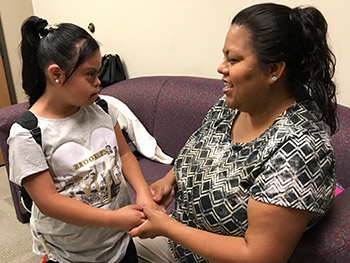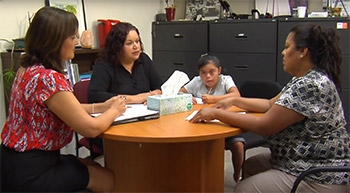Receiving Information in a Language you Understand

Receiving Information in a Language you Understand

Disability Rights California works to help people with intellectual/developmental disabilities access language services that reflect their needs, choices and cultural values.
Leslie Sedano enjoys watching movies on her tablet and playing with her toys. She has Down syndrome and receives services through the Westside Regional Center in Los Angeles. Leslie, like other regional center consumers, has an Individual Program Plan (IPP) that records what services a consumer receives to live in the community. For example, Leslie receives behavior therapy and help with her social skills. She and her mother are monolingual Spanish speakers and need the IPP and the services provided in Spanish.

Regional center consumers like Leslie often face challenges receiving services because of language and cultural barriers. Disability Rights California (DRC) advocated for changes in the law to address these issues.
“The new laws require regional centers to do a number of things, including communicate in the language the consumer prefers during intake, assessment and during IPP meetings”, said Eva Casas Sarmiento, clients’ rights advocate.
About 45 percent of Californians five years of age and older don’t speak English at home, according to the U.S. Census Bureau.
The laws, known as SB 555 and SB 82, clarify a regional center’s duty under the Lanterman Act to provide information and services in a person’s native language. SB 555, which passed in 2013, requires regional centers to translate. SB 82, which passed in 2015, requires regional centers to offer, and upon request provide, a written copy of the translated individual program plan within 45 days of their request as long as the translation is in one of the threshold languages.
 “Before a family can agree to an IPP, they have to understand it,” said Evelyn Abouhassan, senior legislative advocate who worked the two bills. “It’s critical to have the IPP in the language a person prefers. If it isn’t in their language, they can’t agree to it or advocate for changes.”
“Before a family can agree to an IPP, they have to understand it,” said Evelyn Abouhassan, senior legislative advocate who worked the two bills. “It’s critical to have the IPP in the language a person prefers. If it isn’t in their language, they can’t agree to it or advocate for changes.”
This year, DRC sponsored another language bill that will affect children in school. SB 354 would require school districts to translate Individualized Education Programs (IEP) within 30 days. The parent must request it, and the language must be one of the top eight languages in the district, excluding English. It is now heading to the Gov. Jerry Brown.
Thanks to DRC’s legislation, people can receive services in their native language and culture.




